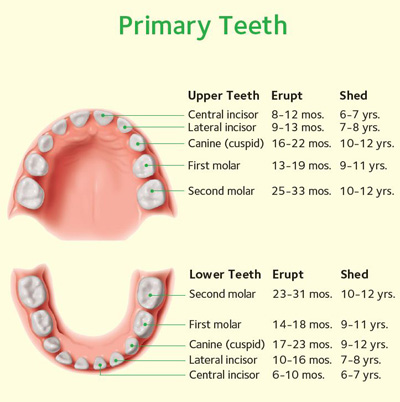


Protect your child's teeth by starting dental checkups early. The American Dental Association and the American Academy of Pediatric Dentistry recommend that the first dental visit should occur when the baby's first tooth appears, but no later than the child's first birthday.
Why schedule a visit so early? A dentist can show you how to clean your child's teeth, talk about feeding, oral habits and recommend dental care products. He or she also can help you make sure your child is getting the right amount of fluoride (FLOOR-ide), a natural mineral that protects teeth. And your dentist can answer questions about your baby's teeth.
Having a well-baby checkup at this age also connects your child to a dental home. This is a place where you can take your child from year to year. This helps the dentist get to know your child's and family's needs, so your child will have the best care.
If your child is a toddler, the dentist will gently examine his or her teeth and gums, looking for decay and other problems. The dentist may also clean the child's teeth. Your toddler can also be checked for problems related to habits such as thumb or finger sucking.
Fluoride treatments and dental sealants are two important ways your dentist can prevent cavities. Dental sealants are a coating that the dentist puts on the grooves of your child's back teeth to protect them. Your dentist will let you know if these treatments are right for your child.
Preventive care from your dentist can save time, money and teeth. Your dentist will recommend a schedule for your child's dental visits.
What is the focus of your child's beautiful SMILE? Strong, healthy teeth!
 Baby teeth-also called primary teeth-are important in the growth and development of a child. Baby teeth can help your child chew foods and speak. They also hold space in the jaws for adult teeth that are growing under the gums.
Baby teeth-also called primary teeth-are important in the growth and development of a child. Baby teeth can help your child chew foods and speak. They also hold space in the jaws for adult teeth that are growing under the gums.
Babies are born without teeth. Usually baby teeth start to appear in the mouth when the child is 6 months old. By the third birthday, most children have a full set of 20 baby teeth including incisors, canines and molars.
This chart tells the names of baby teeth, when they come in (erupt) and when they fall out (are shed). Baby teeth be will replaced by permanent (adult) teeth. However, not all children get the same teeth at the same times. Your child's teeth may erupt earlier or later than the times shown here.
Learn more from the American Dental Association: